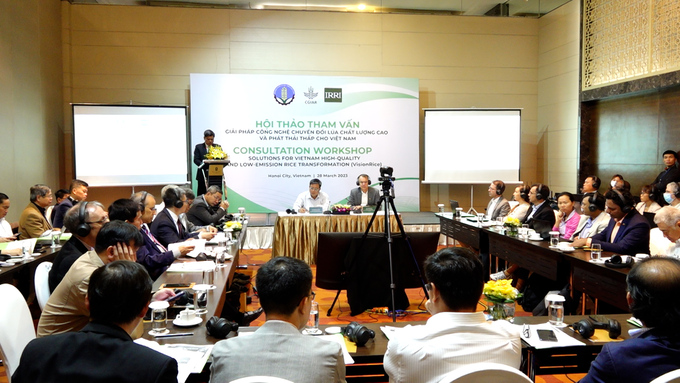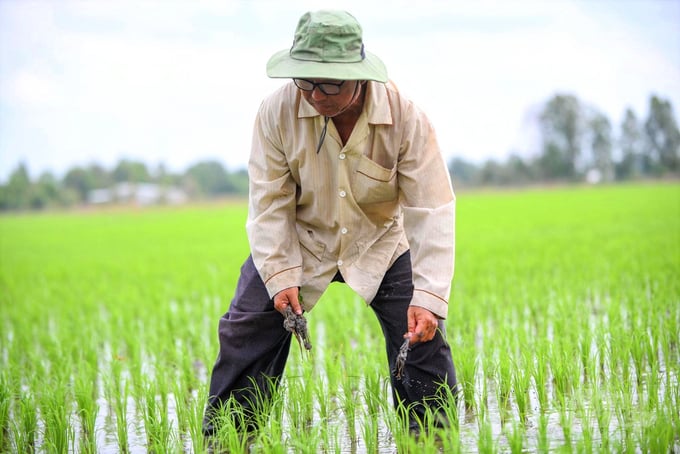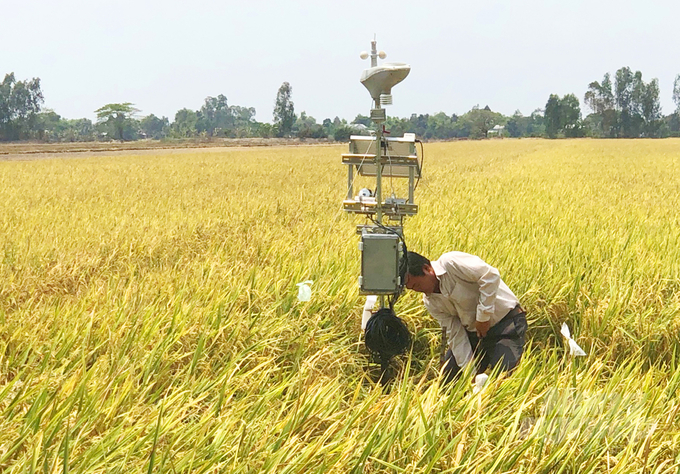November 25, 2025 | 01:02 GMT +7
November 25, 2025 | 01:02 GMT +7
Hotline: 0913.378.918
November 25, 2025 | 01:02 GMT +7
Hotline: 0913.378.918
The Ministry of Agriculture and Rural Development (MARD) and the International Rice Research Institute (IRRI) organized a workshop on "Technological solutions to convert high-quality and low-emission rice for Vietnam" on March 28. The seminar seeks to exchange expertise on high-quality, low-carbon rice production changes in Vietnam.
According to the Ministry of Agriculture and Rural Development, the Mekong Delta's rice output has remained stable in recent years at 24-25 million tons, accounting for more than 50% of total rice production and more than 90% of the country's rice exports, providing jobs and income to more than 1.5 million farmers, contributing significantly to the goal of ensuring national food security, promoting the development of the rice processing industry, and exporting rice.
Vietnam's rice sector has been continually expanding in recent years, with many new high-quality varieties, more synchronously invested infrastructure, numerous firms investing in contemporary technologies, and commercial processing in rice production.

A consultation workshop on solutions to support the transformation of high-quality and low-emission rice production in Vietnam was organized by the Ministry of Agriculture and Rural Development in collaboration with the International Rice Research Institute (IRRI) on March 28. Photo: Dieu Linh.
However, according to Deputy Minister of Agriculture and Rural Development Tran Thanh Nam, the Mekong Delta rice production industry still lacks large-scale specialized rice farming areas, cooperation among farmers, cooperatives, and businesses, and unsuitable farming measurement methods, resulting in loss and large greenhouse gas emissions...
To address these issues, the MARD Deputy Minister revealed that the ministry had developed and implemented a number of policies and initiatives, including the project for "sustainable production of 1 million ha of high quality rice in the Mekong Delta" (referred to as the 1 million ha of rice Project).
According to Deputy Minister Tran Thanh Nam, the project would be conducted in a multi-purpose manner. As a result, the content of developing specialized rice areas includes using certified rice varieties, ensuring quality, and aiming at multi-valued needs; implementing sustainable farming processes to save resources, cause less environmental pollution, and reduce emissions; organizing production in the direction of promoting cooperation and association among farmer households, cooperatives, and enterprises; and creating high income for rice growers and high added value for products.
Furthermore, synchronized mechanization of rice production and rapid application of high technology and digital technology to advance accurate and innovative rice farming practices, towards developing a rice brand to reduce emissions, and issuing certificates of receipt for ecological rice products, low-emission rice.
Huynh Van Thon, Chairman of the Board of Directors of the Loc Troi Group, stated that the production organization according to the model of broad fields, application of technology, automation, digitalization, and cooperation is a good basis for the Project.
"With official planning, synchronous investment in facilities, field planning connected with investments in infrastructure, transportation, and irrigation will. As a result, implementing the scheme per current international farming process standards, labor and greenhouse gas emission norms, would help raise the quality of goods, develop brands, and increase farmers' earnings ".

If the goal of scaling up 1 million hectares of low-emission rice production is achieved, carbon credits will bring significant benefits to all farmers in the Mekong Delta. Photo: Le Hoang Vu.
The Ministry of Agriculture and Rural Development confirmed that foreign organizations are critical to the project's success in terms of professional and technical guidance, as well as supporting development direction in compliance with international regulations.
Dr. Cao Thang Binh (World Bank senior agriculture expert in Vietnam) noted that the project of 1 million hectares of high-quality rice is "a good effort, at the appropriate moment," when the agricultural industry has to convert the output to low-emission.
The World Bank has helped the Ministry of Agriculture and Rural Development conduct two programs to turn agriculture into a low-emissions, sustainable industry. Recently, the Vietnam - Sustainable Agriculture Transformation (VnSAT) program assisted in the conversion of 148,000 hectares of rice cultivation to a low-emission system. Binh stated that the World Bank's intention is to repeat this model on the basis of the previous initiative.
Dr. Cao Thang Binh further stated that Vietnam is the first country that the World Bank supports in producing high-quality rice and decreasing emissions in order to sell carbon credits in global carbon markets. "In terms of resources, financial funding and the World Bank are available; it only depends on how soon and successfully Vietnam receives those resources to carry out the Project," Binh stated.

The positive changes in rice production in the Mekong Delta that the VnSAT Project has achieved in recent years are an important premise for the Project of 1 million hectares of high-quality rice. Photo: Trung Chanh.
Dr. Bas Bouman, Director of Research and Development and Distinguished Scientist at IRRI stated that after many years of collaboration between IRRI and Vietnam, IRRI is boosting its cooperation with the Ministry of Agriculture and Rural Development. According to Mr. Bas Bouman, IRRI is attempting to combine the use of research and methodologies to apply to the growth of Vietnam's rice sector as well as encourage technology transfer to assist farmers in increasing productivity and output, which improves farmers' income and living conditions.
"With the introduction of new varieties that increase the value of rice grain, we have long-term plans and strategies with Vietnam, focusing on three pillars: research, development, and impact." "Dr. Bas Bouman stated.
Translated by Linh Linh

(VAN) Viet Nam is entering the pivotal period of 2025-2030, moving toward the formulation of the Remote Sensing Law, which will establish a legal foundation for the development of national digital data.

(VAN) The agricultural sector is finalizing the strategic framework for emission reduction, setting the goal of sharply cutting methane and 403.7 million tons of CO2 equivalent and moving toward Net Zero by 2050.
/2025/11/22/2236-1-153832_483.jpg)
(VAN) The National Marine Spatial Planning is opening up opportunities for sustainable blue sea development across 21 coastal localities.

(VAN) Viet Nam’s forestry sector is undergoing a comprehensive transformation, strengthening management, protection, and development efforts to maintain ecological security and drive green, sustainable growth.

(VAN) Viet Nam is accelerating efforts to digitize reservoir operations, from real-time data to hydraulic modelling.
/2025/11/21/3348-2-102623_454.jpg)
(VAN) National Assembly delegate Nguyen Thi Lan has proposed adding special mechanisms to attract human resources to the agricultural, forestry, and fishery sectors, addressing the shortage of high-quality personnel.

(VAN) Over the past two decades, the unified legal framework for water resource management has been perfected, becoming a crucial foundation for ensuring national water security.